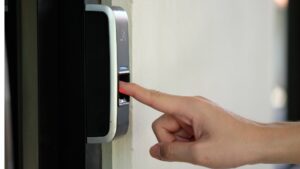
As a business owner, having reliable security measures in place is essential for protecting your company’s assets and data. Thanks to the advance in technology for access control systems, local businesses can now easily integrate biometric solutions as a secure way of managing building access points.
Read on to find out when and how to implement biometrics into your security infrastructure. To get a custom quote, contact our team today.
The Advantages of Using Biometric Access Control Systems
Access control systems have come a long way from simply relying on keys or passwords to grant entry. One of the innovative methods currently being adopted is biometrics. This technology utilizes unique physical characteristics as authentication measures.
Unlike traditional methods, biometrics eliminates the need for physical keys or PIN codes that can easily be lost or guessed. This approach is extremely secure, as it is extremely difficult to fake someone’s unique characteristics. Biometrics enhances the overall safety of access control systems and ensures that only authorized personnel can enter secure areas.
Some businesses are concerned about the privacy and data security implications of using biometric systems. However, like any other sensitive or confidential business information, there are many ways to help safeguard biometric data, such as limiting user access, enforcing encryption, and ensuring network security.
When it comes to using biometric systems for access control, it’s important to weigh the pros and cons carefully to determine if they’re the right solution for your needs.
Most Common Biometric System Modalities
The most common types of biometric modalities used for access control include facial recognition, fingerprint scanning, iris recognition, and voice recognition. Understanding these types of biometrics and their application can help organizations make more informed decisions while choosing a security system that meets their specific needs.
- Facial recognition scans an individual’s face and matches it against a database to grant access.
- Fingerprint scanners read the unique ridges and indentations on fingertips to verify identity.
- Iris recognition scans the distinctive patterns in a person’s eyes.
- Voice recognition uses tone, accent, and pronunciation to identify individuals.
Selecting the Right Biometric System for Your Business
A biometric access control system offers advanced security measures customized to your business needs, but choosing the right biometric system is a task that requires careful evaluation. You need to assess your premises and determine which system will best suit your security needs. Choosing the right biometric system and setting up data safeguard parameters from the start is crucial both for avoiding security breaches and ensuring your business’s safety.
Questions to ask in your evaluation may include:
- How and where in the building will a user need to access the system?
- Who will control the database and where will the data be stored?
- What is the biometric security level that best matches the security need of the business?
- How much support will the system supplier provide?
- What is the maximum price point for a system that matches your above criteria?
Secure, Reliable Access Control Systems
Organizations must remain up-to-date with the most current technology to ensure the safety of their staff and property. With years of experience in the field, Wilson Fire Equipment has the knowledge and expertise necessary to help you install a comprehensive and reliable biometric access control system. Our team will help you every step of the way. Contact us for a quote now.
